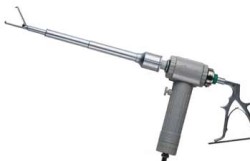Top Class Actions’s website and social media posts use affiliate links. If you make a purchase using such links, we may receive a commission, but it will not result in any additional charges to you. Please review our Affiliate Link Disclosure for more information.

- myomectomy (removal of fibroids)
- hysterectomy (removal of the uterus)
- oophorectomy (removal of the ovaries)
- salpingectomy (removal of fallopian tubes)
However, according to recent research, women who undergo these surgeries have an increased risk of developing cancer in the two years after the procedure. This is especially true if the surgeries listed above were performed using a power morcellator device, a medical tool that has become quite controversial in the medical field because of their alleged tendency to spread cancer cells at the site of surgery.
This is a starling discovery, as it is estimated that 50,000 women undergo hysterectomy morcellation procedures each year within the United States.
What is a Power Morcellator?
A power morcellator is a medical device that employs rotating blades to cut up organ tissues, which are then suctioned out of the body. Morcellation, unlike traditional myomectomies, hysterectomies, oophorectomies, and salpingectomies, requires a small incision and not a major incision through major muscle groups, allowing for a quicker recovery time for patients undergoing these types of surgeries. Because of this feature, power morcellator devices quickly rose in popularity among patients and surgeons alike.
However, because of the recent studies and morcellation lawsuits, the U.S. Food and Drug Administration (FDA) has issued a safety communication to doctors and the medical community as a whole, warning that power morcellators can spread unsuspected cancerous tissue when used during laparoscopic gynecological surgeries. The agency pointed out that one in every 350 women who undergo robotic hysterectomies or myomectomies in order to remove uterine fibroids have undiagnosed uterine sarcomas. If these uterine sarcomas are morcellated, the cancer cells can spread and potentially upstage an individual’s cancer diagnosis from stage one to stage four.
According to Cancer.net, some common signs of uterine cancer that may occur include:
- Unusual vaginal or uterine bleeding
- Pain and/or difficulty when urinating
- Pain during sex
- Pain in the pelvis or pelvic area
If you experience any of these symptoms after undergoing a gynecological surgery that used a power morcellator, you should contact your physician immediately.
Power Morcellator Litigation
Attorneys are searching for women who underwent laparoscopic hysterctomy, myomectomy, oophorectomy, or salpingectomy procedures using a morcellation device and later developed uterine cancer to bring morcellation cancer lawsuits or join morcellation cancer class action lawsuits against the manufacturers of these dangerous medical devices.
Do YOU have a legal claim? Fill out the form on this page now for a free, immediate, and confidential case evaluation. The morcellation cancer attorneys who work with Top Class Actions will contact you if you qualify to let you know if an individual lawsuit or class action lawsuit is best for you. [In general, morcellator cancer lawsuits are filed individually by each plaintiff and are not class actions.] Hurry — statutes of limitations may apply.
ATTORNEY ADVERTISING
Top Class Actions is a Proud Member of the American Bar Association
LEGAL INFORMATION IS NOT LEGAL ADVICE
Top Class Actions Legal Statement
©2008 – 2024 Top Class Actions® LLC
Various Trademarks held by their respective owners
This website is not intended for viewing or usage by European Union citizens.
Get Help – It’s Free
Join a Free Morcellation Cancer Class Action Lawsuit Investigation
If you or a loved one were diagnosed with cancer in the uterus, pelvis or abdomen within two years of undergoing surgery for a myomectomy (removal of fibroids), hysterectomy (removal of the uterus), oophorectomy (removal of the ovaries), or salpingectomy (removal of fallopian tubes), you may have a legal claim. See if you qualify by filling out the short form below.
An attorney will contact you if you qualify to discuss the details of your potential case at no charge to you.
Oops! We could not locate your form.












